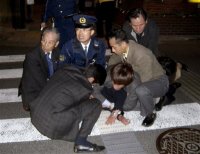
Jamiacan Gangsters are commonly called "Rude Boys"

The Bad Boyz of the Yakuza gang sporting their common gang tattoos

Janjaweed translates in Arabic to "a man with a gun on a horse"
Darfur, Sudan
In Darfur, Sudan, lives one of the most notorious gangs in the world: The Janjaweed. The Janjaweed first appeared in 1988 when Chad, France, and America defeated the Libyan army. The Libyan political party then moved into Darfur and were hosted in the country. The Libyan forces were later destroyed by Chad, but their weapons remained with Darfur. As a result, the Janjaweed gang was formed with these new weapons which gave them power and they were soon given instructions and tasks by the government. Then came the Sudan Liberation Movement which caused the Sudanese government which "controls" the Janjaweed to order a counter-insurgency initiative and began what we know as the "genocide in Sudan"
The History of the Janjaweed and problems in Sudan
Jamaica
The History of gangs in Jamaica can be traced back to its first youth sub-culture, the Rude Boy. Once Jamaica got its independence from Britain in the early sixties, the country became extremely overpopulated and many economic and social problems such as healthcare deficiency, unemployment, disease, and government corruption began."The response to these conditions was the start of a creation of a new subculture, unofficially called scufflers. Scuffling was just scrounging to get by, by any means necessary. This often meant involvement in the underground economy. Pimping and prostitution, begging and stealing became the unofficial economic activities in the shanty towns of West Kingston." "These rude boys defined their own personal style. These youths, boys from fourteen to twenty-five years, carried German ratchet knives and handguns. They came from all over West Kingston. With deteriorating living conditions, these rude boys were, above all, angry." One of the things that Jamaican Rude boy did were capture what they felt into music such as reggae or ska.
The life and story of a Rude boy is perfectly captured in Israel Vibrations: Rudeboy shufflin song and music Video (Notice that both singers have canes and crutches because they contracted the polio disease growing up poor in jamaica in the 1960's)
A part of the songs lyrics goes like this:
Inna the ghetto old fence vibrate.
Stiffnecked fools, you deny me.
Promote the worst and slacky-tidey.
Now the youth so viciously. / Got to face your reality.
A this a rudeboy shufflin.
Millions of youth more violently.
So how you think you a go hold back me?
">
Japan
Japan is home to a very large and famous international gang called the Yakuza.
The Yakuza name originates from the worst possible score in a japanese card game. The game, similar to blackjack has a highest possible # of 19. Ya-Ku-Sa is the phonetic sounding of 8-9-3 which is the number 20 or zero points, a bust. This is meant to symbolize the mantra of the Yakuza, no worth to society, the misfits and rebels.
The History and origin of the Yakuza is somewhat debatable:
One version says they are the "descendents of the 17th-century kabuki-mono (crazy ones), outlandish samurai who reveled in outlandish clothing and hair styles, spoke in elaborate slang, and carried unusually long swords in their belts." These men who were once servants of the Shogun became unnecessary once peace came in the tokugawa era so they began to devote their lives to stealing, gambling, and mayhem.
The second version of the Yakuza history is one endorsed by current Yakuza members today. They claim to be "descendents of the machi-yokko (servants of the town) who protected their villages from the wayward hatamoto-yakko. The official yakuza history portrays the group's ancestors as underdog folk heroes who stood up for the poor and the defenseless, just as Robin Hood helped the peasants of medieval England."
traditional yakuza members fell under three general categories: tekiya (street peddlers), bakuto (gamblers), and gurentai (hoodlums). "Traditionally the tekiya, medieval Japan's version of snake-oil salesmen, worked the fairs and markets while the bakuto worked the towns and highways. The gurentai, by contrast, modeled themselves on American gangsters of the Al Capone era, using threats and extortion to achieve their ends. After World War II, in the governmental power void caused by the Occupation, the gurentai prospered, and their ranks swelled. They also brought organized crime in Japan to a new level of violence, replacing the traditional sword with modern firearms, even though guns were now officially outlawed in the country as a result of the surrender." They ultimately survived because of the power and force they used to prosper economically.
This video gives more insight into the interesting culture of the traditional Yakuza practices as well as recent culture. ">








